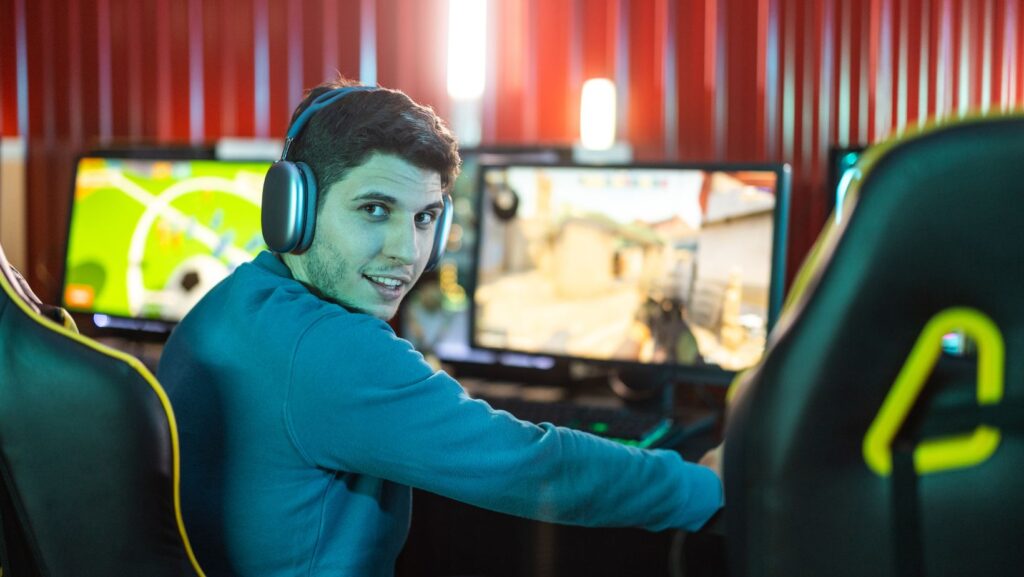In the technicolor world of video games, the term “gamer” has evolved into a badge of honor, a self-proclaimed title for those who’ve delved beyond the surface of this digital realm. But what does it truly mean to be a gamer? Is it simply about acing every level, or is there more to it?
This article aims to unravel the layers of being a gamer, from the exhilarating highs of victory to the intense dedication required to master a game. We’ll explore the culture, community, and commitment that define gamers, shedding light on this often misunderstood identity.
What Does it Mean to be a Gamer
Diving deeper into the essence of being a gamer, it’s critical to fully comprehend the gamer’s identity. This identity unequips from just being a frequent player and expands into behavioural patterns, lifestyle, and values.
Defining “Gamer”
 A gamer transforms from merely a descriptive term for an individual who plays video games to represent, in a sociocultural context, a household name that embodies a unity of purpose and a shared affinity. An immersive example illustrates this point. Imagine not just controlling a fictional character, but actually embodying their persona, challenges, and triumphs; this affinity is a hallmark trait of a gamer.
A gamer transforms from merely a descriptive term for an individual who plays video games to represent, in a sociocultural context, a household name that embodies a unity of purpose and a shared affinity. An immersive example illustrates this point. Imagine not just controlling a fictional character, but actually embodying their persona, challenges, and triumphs; this affinity is a hallmark trait of a gamer.
Evolution of Gamers Over Time
Gamers’ identity hasn’t remained static; it’s undergone transformations as the gaming industry evolved. From solitary arcade enthusiasts of the 1980s to multi-player online gamers of the present, each era contributes defining characteristics to the gamer identity. For instance, in the 1990s, gamers were often portray as antisocial recluse, obsessed with their consoles. But, the gaming scene transformed in the 2000s with advanced technology, making gaming a social phenomenon, evolving the gamer identity into a more communal, interactive persona. With ever-advancing technology, the depiction of gamers continues to shift, a constant journey revealing newer layers in the gamer identity.
Video Games and their Influence on Gamers
Video games enact a substantial influence on gamers, shaping identities and impacting social behavior. Delving into this, we look into the important roles games play in the lives of gamers.
Role of Video Games in Shaping Gamers’ Identity
 Video games aren’t just a source of entertainment, they have a direct influence on a gamer’s identity. Often, game genres reflect personal preferences and the types of player skills. An individual who prefers strategy games like “Civilization VI,” for instance, might be inclined towards critical thinking and problem-solving. Similarly, a multiplayer online game like “World of Warcraft” attracts individuals interested in team coordination and social interaction. Through the selection of games and play styles, gamers express their identities, with their choices serving as an extension of their personalities.
Video games aren’t just a source of entertainment, they have a direct influence on a gamer’s identity. Often, game genres reflect personal preferences and the types of player skills. An individual who prefers strategy games like “Civilization VI,” for instance, might be inclined towards critical thinking and problem-solving. Similarly, a multiplayer online game like “World of Warcraft” attracts individuals interested in team coordination and social interaction. Through the selection of games and play styles, gamers express their identities, with their choices serving as an extension of their personalities.
Impact of Video Games on Social Behavior
Beyond identity formation, video games bear considerable influence on a gamer’s social behavior. Contrary to popular belief, gaming isn’t an isolating activity. Studies from authoritative sources like American Journal of Play show that multiplayer online games foster a heightened sense of community and social interaction. They promote cooperation, as seen in games like “Overwatch” where team coordination is paramount for victory. These online platforms also expose gamers to a diverse set of people, nurturing global connections and cross-cultural communication. Therefore, video games modify and mold the social behavior of gamers, enhancing their social skills and promoting communal interaction.
Becoming A Gamer: Is it a Lifestyle or a Hobby?
 Becoming a gamer isn’t just about playing games. It’s about the culture, community, and dedication. It’s a lifestyle that reflects personal preferences, impacts social skills, and fosters global connections. As technology advances, so too does the identity of the gamer, evolving from solitary arcade enthusiasts to interactive online community members. Games like “Civilization VI” and “World of Warcraft” offer platforms for players to express their personalities and enhance their social interaction. Being a gamer is no longer a hobby confined to the basement. It’s a lifestyle, a community, and a platform for personal expression. The gamer identity is multifaceted and continues to evolve in today’s gaming landscape.
Becoming a gamer isn’t just about playing games. It’s about the culture, community, and dedication. It’s a lifestyle that reflects personal preferences, impacts social skills, and fosters global connections. As technology advances, so too does the identity of the gamer, evolving from solitary arcade enthusiasts to interactive online community members. Games like “Civilization VI” and “World of Warcraft” offer platforms for players to express their personalities and enhance their social interaction. Being a gamer is no longer a hobby confined to the basement. It’s a lifestyle, a community, and a platform for personal expression. The gamer identity is multifaceted and continues to evolve in today’s gaming landscape.

